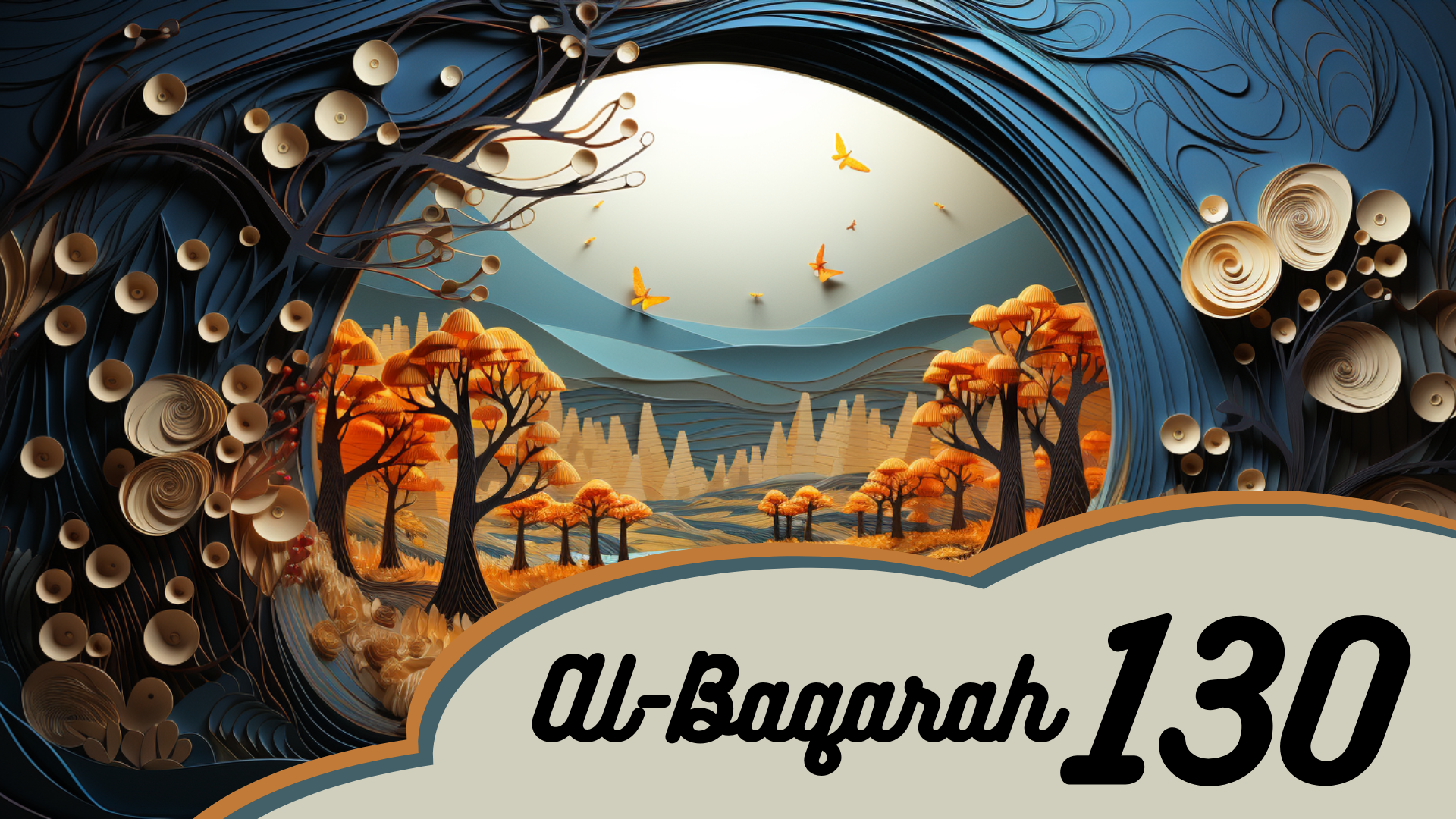Overview of Surah Al-Baqarah
Surah Al-Baqarah is the second chapter of the Quran and the longest, consisting of 286 verses. Its name, “The Cow,” refers to an event recounted in the chapter involving the Israelites and a cow. Surah Al-Baqarah covers a wide variety of topics, including guidance for personal development, laws for social and economic justice, and narratives of past prophets to provide moral lessons.
Introduction
In this post, we will delve into an in-depth analysis of verse 130 in Surah Al-Baqarah. This verse is part of a larger narrative about Prophet Ibrahim (Abraham) and serves as an important cornerstone in understanding the concept of monotheism (Tawhid) in Islam.
Structure and Context
Surah Al-Baqarah was revealed in Madinah, a period marked by the establishment of an Islamic society. The verses before and after verse 130 recount the story of Prophet Ibrahim, his son Ismail (Ishmael), and their establishment of the Ka’bah as a place of monotheistic worship.
Explanation of Verse 130
Translation
Verse 130 of Surah Al-Baqarah translates to: “And who would be averse to the religion of Abraham except one who makes a fool of himself. And We had chosen him in this world, and indeed he, in the Hereafter, will be among the righteous.”
Explanation
This verse emphasizes the importance of following the path of monotheism as set by Prophet Ibrahim. It suggests that turning away from his path equates to foolishness and loss while following it promises righteousness in this life and the hereafter.
Key Themes and Concepts
The key themes in this verse include monotheism, righteousness, divine selection, and the concept of the Hereafter.
Significance in Daily Life
The verse serves as a reminder for Muslims to practice monotheism in their daily lives, aspiring to the moral and ethical standards set by Prophet Ibrahim. It also encourages reflections on one’s actions and attitudes towards the Hereafter.
Understanding the Historical Context
The verse was revealed in a context where Muslims were establishing a new society in Madinah. They were surrounded by various cultures and religions including polytheism, hence the emphasis on monotheism.
Interpretations and Scholarly Perspectives
Variations in Interpretation
While the overarching themes remain the same, scholars have interpreted this verse in various ways. Some focus on the aspect of monotheism, others on the moral character of Prophet Ibrahim, while some on the concept of the Hereafter.
Scholarly Commentary
Scholars like Ibn Kathir have emphasized the importance of monotheism and the rejection of anything contrary to it as depicted in this verse. Others like Al-Tabari have highlighted the status of Prophet Ibrahim as an ideal model for Muslims.
Connection to Other Verses and Surahs
This verse links to other verses and surahs that mention Prophet Ibrahim and his monotheistic path, such as Surah Al-An’am (6:161) and Surah Al-Nahl (16:123).
Relevance to Surah Al-Baqarah
The verse complements the overarching themes of Surah Al-Baqarah, which include guidance, faith, prayer, charity, and the importance of community.
Link to Other Quranic Verses
The verse also links to other Quranic verses emphasizing monotheism, such as in Surah Al-Ikhlas.
Application to Contemporary Issues
In today’s world, where there are numerous ideologies and belief systems, this verse serves as a reminder for Muslims to remain steadfast in their belief in monotheism.
Personal Reflection and Internalization
Lessons for Individuals
The verse teaches the importance of steadfastness in faith, the pursuit of righteousness, and the preparation for the Hereafter.
Challenges and Experiences
The verse reminds us that we may face challenges in maintaining monotheism in a diverse world. However, these challenges should be viewed as opportunities for spiritual growth.
Conclusion
Verse 130 of Surah AlBaqarah is a profound verse that encompasses the essence of monotheism, the path of righteousness, and the assurance of a reward in the Hereafter. By understanding and internalizing its message, one can strive to emulate the noble qualities of Prophet Ibrahim, thereby enriching their spiritual journey. This verse, like many others in the Quran, serves as a timeless guide for Muslims, and indeed for anyone interested in understanding the core tenets of Islamic faith and the exemplary character of the prophets it venerates.




